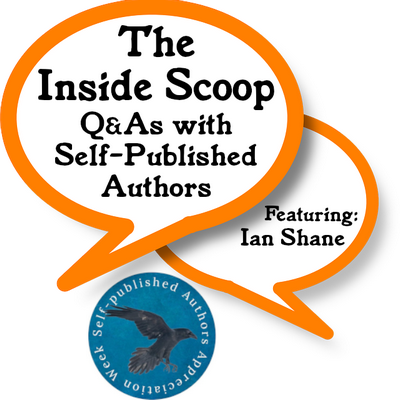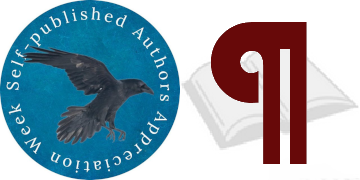
Ian Shane has become one of my favorite authors over the last couple of years—I’ve given copies of his books away and recommended them to people in real life and online. I’m very glad that he agreed to take part in this series. I hope you enjoy this—and click on the links below, there are some solid recommendations here.
Before we get into things, why don’t you give the reader a brief introduction to you and your work?
Hi, I’m Ian Shane! I’m the author of three novels (Radio Radio, Postgraduate, and In Ten Years). I’m finishing up an “almost memoir” (Sundry Notes of Music) which should be ready for publication in November. If you want to put a label on my work, my genre is “Lad Lit,” in the great tradition of Nick Hornby.
My website is currently down, but you can find my books at viewauthor.at/ishane, and I’m on Twitter @ThatIanShane.
What are some of the biggest misconceptions you find that readers have about self-published books?
That they are less than published books. I will take the works of Matthew Hanover (@MatthewHanover), N.J. Cartner (@njcartner), Wesley Parker (@weswritesforfun), and Adam Shaw (and so many others) over many other “traditionally published” authors. Indie authors’ voices are important and, many times, infinitely more interesting.
What kind of costs are associated with self-publishing a book? Do you hire one or more editors, or one editor for a couple of passes? Cover artist? Anyone to help with layout, design, etc.? Beta readers? Or do you take it all on yourself? Are you actually making any money at this, or are you still focused on breaking-even while building an audience?
There is a lot of investing. The lion’s share of the cost is for editing. But it’s sooooo worth it. Melissa Gray (@ProofreaderMG) is the best editor in the business. Editors are a prerequisite to publishing a book, not an option. I have paid for the covers of my previous three books; however, I designed the cover of my next book. I’ve also paid for a website, but I am reevaluating that, as it seems that it only attracts unsolicited messages from web designers offering to redo my website. I’ve also tried some promotional campaigns, which did very little to move the needle when it comes to sales.
I’m not making money off of this. Writing is my passion project, and I’m more interested in building an audience than making money.
Are there tools, mentors, websites you’ve found to help you through this process? Or did you stumble through blindly on your own?
A little bit of both. My first novel was done blindly. However, after I finished my first draft, I joined a writer’s group in St. Paul. It was nice to have a group of beta readers I got to check in with every two weeks. When I started writing Postgraduate, I found some writers on Twitter who had different approaches to promotion and distribution, which I was able to adopt.
How do you juggle marketing/PR/etc. with writing new work? (along with day jobs, family, hobbies, etc., etc.)
It’s the biggest obstacle. I am a writer, not a publicist, and indie authors are forced to be both. It also doesn’t help that my schedule for the day job isn’t exactly consistent, so I don’t have a set time to market the book. The job is the highest priority because I like the finer things in life, such as food and shelter. Writing is next. Especially when I’m in the final stages of a book, I have very little time for spreading the word. I really need to get better at it.
How do you promote your book—what things have worked best for you? What kind of lessons have you learned for things not to do (at least for you)? Do you do any in-person marketing, or are you all online?
I’ve tried a couple of promotional campaigns that didn’t really seem to do anything for sales. I also tried Amazon Ads and have had mixed results on it. Believe it or not, the thing that seems to work the best is Twitter. There is a correlation between when I spend a bit of time on Twitter and sales spikes. I’m not constantly tweeting links to my book, although I take advantage of #WritersLift tweets from time to time.
On a whim, I tagged Jake Ruhd, an on-air personality on The Current in Minneapolis, in a tweet. He hosts a classic alternative show on Sundays, and my second book was about the same kind of music. I wrote that I was waiting for him to discover the book organically, and I just decided to be shameless in getting his attention this way. He retweeted my post, and it got a lot of traction. To this day, that was my best-selling month. (I love this story)
That has started to become a little trickier now that Twitter is so divisive and there is a fracture of social media feeds, I’m trying to find time to devote to other platforms, but it’s exhausting starting all over again to build an audience.
What made you decide that self-publishing was the direction you wanted to go? How often do you question that choice? How do you get through the self-doubt?
When I first started writing Radio Radio, there was no such thing as CreateSpace, and I didn’t know any print-on-demand options. I felt that my book catered to a limited audience, and I didn’t believe a traditional publisher would be interested in inside jokes between me and a few people I worked with. There was an indie publishing house in Bloomington, Indiana (where I was living at the time), and I thought it would be my best option. Having a publishing house like that locally was an advantage of living in a college town. However, the “basic option” was a bit out of my price range, so I started to scrimp as much spare change out of my embarrassingly low paycheck while I wrote the first draft.
I moved to Minnesota and lost my connection to AuthorHouse, so I was trying to find a home for my book. I found SmashWords and CreateSpace and never looked back. I’ve never thought about “what could have been” if I tried to sell the book to a traditional publisher, and if I had the chance to do it all over again, I would do the exact same thing when it comes to publishing.
Have you thought about trying to get a deal with major (or indie) publishers for upcoming works, or are you planning on sticking with self-publishing?
I plan on sticking with self-publishing.
Self-publishing tends to have fewer external deadlines keeping one accountable. How do you maintain your work process or work ethic?
While writing Postgraduate and In Ten Years, I started posting word totals on my day-to-day writing on Facebook. It was a very public way to keep myself accountable, and the fear of failing in front of my friends was a huge incentive to keep my but in the chair and typing. I’m certain that it annoyed most of my friends; however, some kept me accountable and mentioned it any time I was slacking.
What is your favorite and least favorite thing about being self-published?
The great thing about self-publishing is that anybody can publish a book. What isn’t great about self-publishing is that anybody can publish a book.
I love that I don’t have a deadline that anybody else has set and that I don’t have to change my writing to draw in as many people as possible. I love that I get to tell my story on my terms. Writing is art, not a commodity. Picasso and Jackson Pollock never had to submit themselves to a focus group.
The downside is that in 2021, there were 2.3 million new independently published books. And while I love that others have taken advantage of the same system I have, it just makes it harder to market my book. As a writer, I really have to stand out, and that’s not always easy.
2.3 million? I’m feeling better about my TBR List’s size.
How do you decide a book is finally finished and ready? (or how do you avoid “perfection as the enemy of good”?)
I may be the wrong person to ask this. I have rewritten Radio Radio post-publications many, many times. I used to make fun of George Lucas for continuing to “update” the Star Wars trilogy, but I get it now. But, that was my first book and I wanted to get it out as soon as I could.
However, I have honed my process. I have found an amazing editor and the right people to review the writing. But in the end, it’s a feeling I have. I have an inner peace that lets me know that I have expressed what I wanted.
Thanks for your time and participation! Hope you enjoyed it! And do know that there are many of us out here who appreciate and applaud what you do (and our number is growing)!
Thank you for asking me!
Be sure to check out all of Ian Shane’s work—you’ll laugh, you’ll smile, your heart will get warmed all the way down to the cockles!

Clker-Free-Vector-Images from Pixabay
The 2023 Self-Published Authors Appreciation Week Logo was made by Witty and Sarcastic Book Club



2 Pingbacks